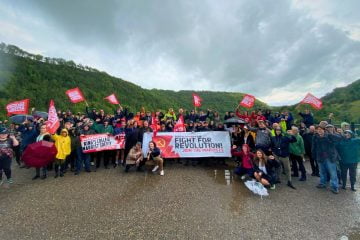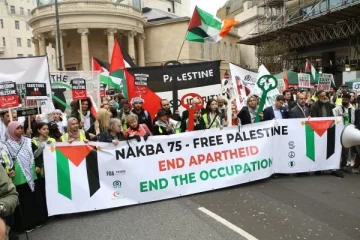I was brought up by French financiers and former Cambodian aristocrats, which is an unusual childhood through which to develop communist ideas. Ever since primary school I was taught that you cannot redistribute wealth because “people are inherently greedy”. These ideas characterised my upbringing.
But the society I lived in was filled with contradictions. Every school in France was emblazoned with the words “Freedom, Equality, Fraternity”, and yet I was taught never to give to beggars because they were sketchy, not to befriend classmates of certain ethnicities because they were different, and not to question the enormous economic disparities between people and countries. That was all to be considered “human nature”.
The fact that I was part of a privileged layer in society meant that, even when I began noticing all the contradictions in society, all that I could turn to for solutions were woolly utopian ideas. “All men are brothers”, that left-liberal slogan, probably best characterised my beliefs during most of my childhood.
In 2012 I took an interest in the social-democratic leader François Hollande who promised a lot to those who had suffered from the economic crisis. Although I knew little about the detail of his programme, within months of his presidency I found out his popularity had plummeted because of a massive U-turn on his promises.
The so-called ‘centre-left’ in France seemed so weak after that. Those who had made promises in the past had only ever carried them halfway through at best. They had nationalised or partially nationalised some industries, which amounted to not much more than compensation for the bosses of unprofitable industries. The result was that, in one way or another, the bosses got fat off state money and made no significant investment in the economy with their own cash. The bureaucratic, top-down, management of the nationalised industries, on capitalist terms, stalled their development dramatically.
For me, it was gradually becoming clear that reform wasn’t going to cut it. But so far, the ideas of communism, although interesting, seemed to be too much of a leap into the unknown. I was still being fed ideas from statisticians and economists like Hans Rosling, who insisted that the free market was making everything better thanks to profits trickling down from the rich to the poor.
And yet I couldn’t ignore the fact that, no matter what statistics you use, or clever theories you hide behind, the rich were getting richer while the poor got poorer. The free market “lifting people out of poverty”, as right-wingers tend to claim, doesn’t count for much when the threshold to be considered “out of poverty” is to be living off more than $1.90 per day.
I struggled to let go of the idea that this could be changed by creating a “nicer capitalism”. I put my faith in NGOs, charities, and parliamentary democracy, but I was becoming rapidly disillusioned with these institutions. You don’t need to look hard to find out how many millions are spent by charities each year to pay the bloated salaries of their management teams, and how little money actually goes to the causes they are supposed to support.
Participating in Youth Parliament workshops was also revealing about just how closely the state is tied to the system it is supposed to govern and regulate. The result is the total inability of the state to solve any of the problems the system creates. I watched as the careerists and hypocrites who led the Youth Parliament acknowledged the problems facing the world and urged us to solve them, but when genuine solutions were put on the agenda they were shut down and bureaucratically manoeuvred against to prevent them even being discussed. As it was in this Youth Parliament, so it is in the actual state institutions. I was made very aware that I had been participating in a training exercise for the future gatekeepers of the Establishment.
By the end of high school, I was weighed down with dozens of contradictions between what I had been taught about society and what I had seen of it. It was through reading Marx that I was finally able to break with the conservative world view that my upbringing had given me.
My philosophy teacher introduced me to three extracts from the Economic and Philosophical manuscripts of 1844, On the Jewish Question and Capital. Having never understood what capitalism really was, I soon learned about the economic foundation of society: the exploitation of the workers for profit. This was enough for the pieces to start falling into place, and for me to realise that everything I opposed in society: poverty, war, oppression, economic crises, climate change, politics as I knew it, and so on, had its basis in the economics of the capitalist system. No longer were all men brothers in my eyes. The ruling class, in whose interests this system is perpetuated, are not brothers, but class enemies.
After that, I read the Communist Manifesto with wide eyes because, for the first time, I was reading a clear scientific explanation of the world and the forces that could change it.
“Communist” systems and revolutionary movements have been and gone throughout history, mostly amidst failures and disappointments. But I consider it my duty to study and understand what has happened before, to make sure that next time we are successful. It’s hard work, but I’m willing to do it because the alternative is horror without end: capitalism, with its wars, crises, poverty, and environmental disaster rampaging across the world indefinitely.
It took me several years to understand my experience of the world, and to draw revolutionary conclusions. But now that I have done so I must do something about it. To quote Marx, “philosophers have only interpreted the world in various ways; the point however is to change it.”
by Nick Oung, UCL Marxists



